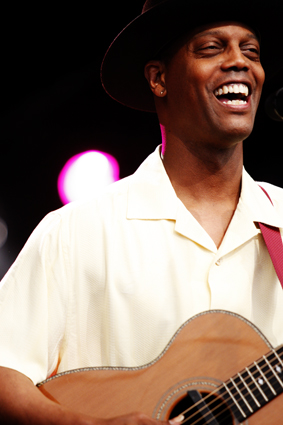Search
Toby Venables talks to Eric Bibb at Cambridge Folk Festival 2008

Toby: Last time you played at Cambidge was six years ago. What's it like to be back?
Eric: Wonderful. What a great crowd. This is one of the holy gatherings on the calendar - it's been a while and I'm really glad to be back.
T: You're on tour at the moment, but how do festival compare with regular tour dates?
E: Festivals in general tend to be huge outpourings of collective energy - and optimism... Anyone who plans a festival for the English summer and prays for the great weather we're having at the moment knows! It's just a very kind of ‘up' vibe at a Festival. We've been in France a lot, we've been in the States, but England is kind of where I got my big start, internationally, so it's dear to me.
T: The weather was very good to you for your performance - the sun came out as you started and went as you left the stage...
E: That wasn't a deal I made with my maker... I was just really happy to see the sun. When we arrived it was really coming down, and I knew people were going to brave the weather but stil I felt bad for all the people outside the tent area. But then it just kind of cleared up, and there we were, kind of shining at each other, so I'm grateful for that.
T: It was interesting seeing you perform after African musician Bassekou Kouyate, too, for all sorts of reasons. His instrument [the ngoni] being the forerunner of the banjo, I really felt I could hear elements of blues and bluegrass in a lot of what he was doing.
E: Oh yeah, oh yeah... We're related for sure. I've felt a really palpable, strong connection to quite a few Malian musicians I've met. I've been in love with kora music since I was about 14, when I first heard it, and been drawn to the whole Mandinka culture musically, and had a chance to meet people like Habib Koité - Bassekou was playing with Habib for a while, I think - and Djelimady Tounkara, a wonderful guitarist as well, from Mali. I've known Toumani Diabaté, I knew his cousin Mamadou and some other kora players. So there's definitely a mesh there that naturally works. So I know what you heard. There's some kind of modal home-zone that we share. I'd like to actually collaborate more with some of my Malian friends, and that might happen in the near future.
T: So does the influence go the other way too? There were some songs you were playing today with a texture that was very reminiscent of Malian music.
E: Yes, exactly. I could think of Kokomo for example - that reminded me of that kind of mode, so yeah I can definitely understand why you say that.
T: One of the things that is characteristic of your blues is that it's the happiest blues I've ever heard. Is that a very deliberate choice or is it natural?
E: It's natural. And deliberate... It's really about telling your own story and not pretending to be someone else. Many of my blues heroes had a very different life than the one I"ve been living. They were telling their story from their experiences, and for me to pretend that I walked that road would be pretty ludicrous, you know? I'm an optimistic person because I've had a lot of experiences that nurture optimism. I've had a wonderful start with a really loving family, surrounded by musicians and music, had a chance to travel early. I had a 13th birthday in Kiev. I don't know how many of my finger-picking heroes from the Delta had that experience... But that optimism is just born of my upbringing and the people who have been influential.
T: Was it always acoustic blues for you?
E: There are some people who have been very inspirational - many of those pre-War acoustic finger-picking blues heroes of mine influenced that direction - but I've loved acoustic guitar from age seven. The sound of electric guitars can be completely enchanting - I just never considered myself an electric guitarist. They're almost two different instruments to me. I like playing with electric guitarists but I've never been drawn to explore that instrument. Acoustic guitar has always been my first love.
T: It's an unusual choice, given that acoustic blues players have been rare in recent decades.
E: There is now a newer generation of musicians, particularly African-American, who have been following Taj Mahal's footsteps. Taj was out there all alone for a long time. He's kind of the bridge between my generation and that older generation of people like Mississippi John Hurt, Bukka White, Son House - so it's nice to see a kind of Renaissance in acoustic blues, and very exciting to see more people of my generation who have been drawn into this - I'm thinking of Corey Harris, Guy Davis, Alvin Youngblood Hart, Michael Roach. So, it's a good time for somebody like me!
T: The current tour continues on around the world and into the New Year - do you get to stop and relax after that?
E: Oh no, it's going to go on - not at this pace, though. I'll take a bit of a break. But I'm also working on a new recording project that will be largely solo, a little bit more stripped down kind of stuff. I thought it was time to do that after some prettty ambitious productions, to really strip it right back and really focus on the guitar playing, with some new songs inspired by some old songs - and some old songs as well.
T: And I really hope you do that Malian collaboration...
E: I will. It's gonna happen!
Writer: Toby Venables